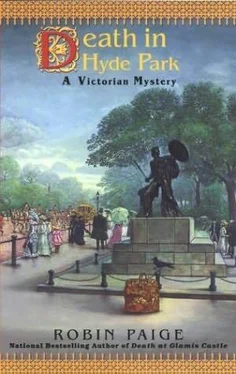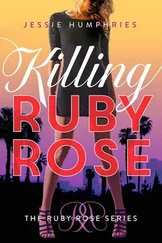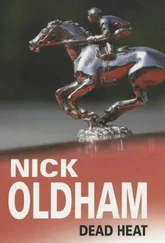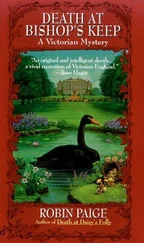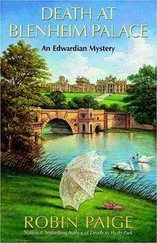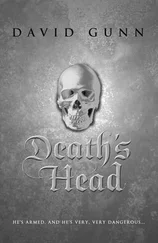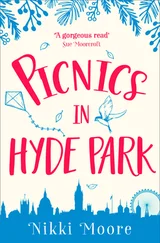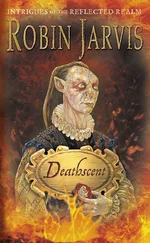Robin Paige - Death in Hyde Park
Здесь есть возможность читать онлайн «Robin Paige - Death in Hyde Park» весь текст электронной книги совершенно бесплатно (целиком полную версию без сокращений). В некоторых случаях можно слушать аудио, скачать через торрент в формате fb2 и присутствует краткое содержание. Жанр: Классический детектив, на английском языке. Описание произведения, (предисловие) а так же отзывы посетителей доступны на портале библиотеки ЛибКат.
- Название:Death in Hyde Park
- Автор:
- Жанр:
- Год:неизвестен
- ISBN:нет данных
- Рейтинг книги:5 / 5. Голосов: 1
-
Избранное:Добавить в избранное
- Отзывы:
-
Ваша оценка:
- 100
- 1
- 2
- 3
- 4
- 5
Death in Hyde Park: краткое содержание, описание и аннотация
Предлагаем к чтению аннотацию, описание, краткое содержание или предисловие (зависит от того, что написал сам автор книги «Death in Hyde Park»). Если вы не нашли необходимую информацию о книге — напишите в комментариях, мы постараемся отыскать её.
Death in Hyde Park — читать онлайн бесплатно полную книгу (весь текст) целиком
Ниже представлен текст книги, разбитый по страницам. Система сохранения места последней прочитанной страницы, позволяет с удобством читать онлайн бесплатно книгу «Death in Hyde Park», без необходимости каждый раз заново искать на чём Вы остановились. Поставьте закладку, и сможете в любой момент перейти на страницу, на которой закончили чтение.
Интервал:
Закладка:
Robin Paige
Death in Hyde Park
CHAPTER ONE
With this sword do justice, stop the growth of iniquity, protect the Holy Church of God, help and defend widows and orphans, restore the things that are gone to decay, maintain the things that are restored, punish and reform what is amiss, and confirm what is in good order.
The Archibishop of Canterbury, presenting the Sword of State to King Edward VII at his coronation, 9 August 1902Edward VII almost missed his coronation. The great event had already been postponed some eighteen months after Edward ascended Queen Victoria’s empty throne, primarily because of the ugly debacle of the Boer War. But at last the war dragged to its conclusion, and plans were made to crown the King and Queen on 26 June 1902. Heads of state from around the world began to converge on London; twenty-five hundred quail and three hundred legs of mutton were ordered for the Coronation banquet; the Peers took their Coronation robes out of storage and had them cleaned and aired; and the cavalry who were to participate in the parade polished their swords and buffed their golden buttons. The Empire was preparing for a grand exhibition of its power and glory.
The difficulty began some two weeks before the great event, when the King began to suffer severe nausea and abdominal pain. After a few days, his worried physicians brought Sir Frederick Treves into the case. Treves, perhaps best known for his association with the Elephant Man, had written and lectured on the difficult topic of appendicitis, or “perityphilitis,” as it was called. The first appendectomy had been performed in the United States some fifteen years earlier, but the operation was still considered novel, radical, and dangerous. Treves recommended surgery. Edward refused.
“I have a coronation on hand,” the King said testily.
Treves frowned at his sovereign. “It will be a funeral if you don’t have the operation, sir.”
At last, the King gave in, and the surgery, which required less than an hour, was carried out at Buckingham Palace. Since Edward was sixty-one, obese, a heavy drinker and smoker with a family history of gastric cancer, the prognosis was not particularly good. An anxious Empire waited in nail-biting suspense for the dreaded announcement that the King had died under the knife.
But Edward had a strong constitution and an even stronger will to live-after all, he had waited a great many years to ascend his mother’s throne-and he survived. His Coronation was rescheduled for August 9. And while some saw the King’s narrow escape as a dark omen for a reign already marred by a war that could not be won, others understood that it merely proved (as if proof were necessary) that Englishmen lived in the very best of all possible times, in the very best of all possible circumstances, and in the very best of all possible worlds.
It rained on August 9. The heavy gray skies wept over the great, gray city, and frequent showers chilled the August day. But the rain did nothing at all to quench the giddy exuberance of the vast throngs gathered to watch King Edward and Queen Alexandra make their triumphal progress, at last, to Westminster Abbey. The people had waited a long time for this day, and they did not intend to let a few showers spoil their celebration. And while the ceremonies were shorn of the glitter and glamor of foreign heads of state, most of whom had already gone home, the great day was still perfectly splendid-better, many said, because it was a family event rather than an Imperial gala. Thousands of British prelates, princes, and peers gathered to witness the crowning, while hundreds of thousands of British citizens noisily thronged the streets and filled windows along the route of the parade.
At eleven-fifteen in the morning, Edward and Alexandra were passing up St. James Street and through Trafalgar Square, their crystal and gilt coach drawn by eight superbly matched cream-colored horses preceded by an escort of the Royal Horse Guards. The crowd in the square roared when the coach came into sight, followed by ranks of glittering cavalry and foot soldiers, a broad stream of scarlet and gold flowing through the wet, gray streets. It was a demonstration of the Empire’s military prowess, perhaps designed to ease the sting of the recent military disgrace in South Africa, where England’s finest had been hard put to it to suppress a rabble of sixty thousand Boer farmers. But that humiliation was forgotten now. The people had come to see and to cheer the King and Queen, and cheer they did, at the tops of their lungs and with all their hearts.
Jack London, an American writer recently arrived in England, joined the throng. He couldn’t see much except for the backs of the double line of soldiers walling off the line of march, but between their shoulders he saw the gold coach bearing a man and a woman, both in the regal splendor of coronation robes.
“Gaw’ blimey, wot a splendid ol’ chap,” exclaimed a ragged, dirty man leaning on a stick. He dug his elbow blithely into Jack’s ribs and blew his beery breath into Jack’s face. “Ain’t ’e a rum un, eh? As fine a king as ever wore crown, is wot I sez. Too bad ’is ol’ mum kept ’im waitin’ so long to put it on ’is head.”
“An’ there be ’is Queen,” sighed the woman on Jack’s right, whose tattered gray shawl did nothing to shield her disheveled hair against the spitting rain. “A rare beauty, an’ ’er pushin’ sixty, if ye’d b’lieve it.” She heaved a gusty sigh. “Wisht I ’ad a few of ’er diamonds to put in me ’air. I’d glitter, I would.”
Jack London, gloomily calculating that just one of the Queen’s glittering jewels could provide enough to feed the one million subjects who would receive poor-law relief on that day, shook his head in disgust as the Royal coach clattered past. He had never witnessed such mumbo-jumbo tomfoolery, he would write later, except maybe in a Yankee circus. He shoved his chapped hands into the pockets of his ragged coat, lowered his capped head against the rain, and made off through the crowd.
Nearer Westminster, another group of spectators enjoyed a somewhat wider view. Bradford Marsden, his pretty wife Edith, and a dozen guests watched the procession from a high window, sipping champagne and eating fresh oysters. They applauded the crimson-and-gold tide, the ponies prancing, the drums drumming, the bugles bugling, all in a cacophonous celebration of wealth and power. The coronation, Marsden reflected with immense satisfaction, was an inspiring statement of the Empire’s indisputable authority and undeniable magnificence: Long might the Empire endure and prosper, and long might Bradford Marsden prosper with it. He smiled as he thought that the vantage point his guests were enjoying with such careless gaity would have put a hundred guineas a head into his pocket, had he been as hard up for a bit of ready as he’d been in the past-when he’d had to pawn his mother’s emeralds, for instance.
But time and tide had changed for the better, and Marsden was feeling happily flush. His family property and wealth, like that of many of the aristocracy, had vanished in the national decline of agricultural income, and Bradford, the last scion of the family branch, had been forced to fend for himself. Like other young aristocrats-Charles Rolls, for instance, the younger son of Lord Llangattock, was selling expensive motorcars; and Sir Harley Dalrymple-Hay, a baronet, was building underground lines in London-Bradford Marsden had turned his hand to commercial enterprises. He had formed a fortunate association with Cecil Rhodes’s gold mining enterprise in Rhodesia, married Rhodes’s goddaughter, and managed to come out of the war with a substantial profit in his pocket. In fact, his new investment business was doing well enough to allow him to purchase a house and furnish it stylishly, to dress his wife in a Worth gown, and to grace her elegant throat with several fine strands of matched pearls.
Читать дальшеИнтервал:
Закладка:
Похожие книги на «Death in Hyde Park»
Представляем Вашему вниманию похожие книги на «Death in Hyde Park» списком для выбора. Мы отобрали схожую по названию и смыслу литературу в надежде предоставить читателям больше вариантов отыскать новые, интересные, ещё непрочитанные произведения.
Обсуждение, отзывы о книге «Death in Hyde Park» и просто собственные мнения читателей. Оставьте ваши комментарии, напишите, что Вы думаете о произведении, его смысле или главных героях. Укажите что конкретно понравилось, а что нет, и почему Вы так считаете.
